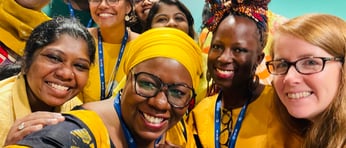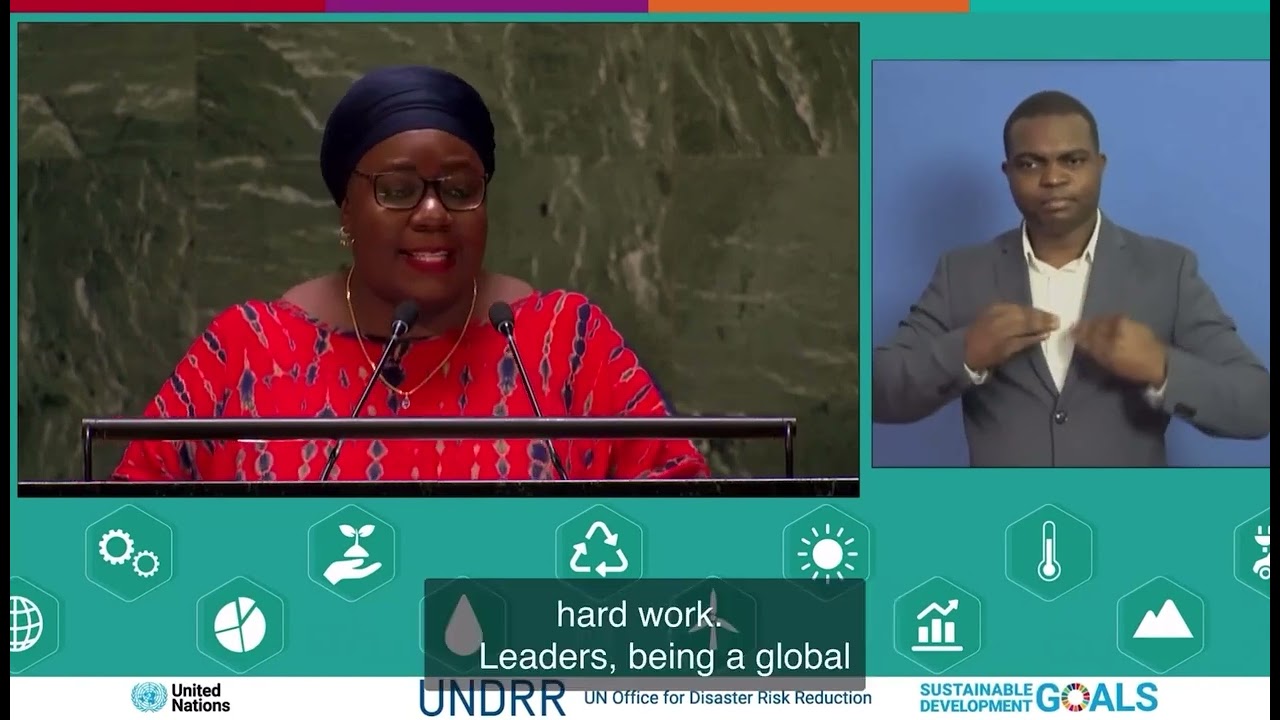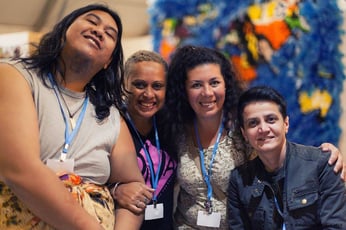

As WEDO reflects on collective wins and challenges during 2023, here are just a few highlights from the past year: Hosting Our First In-person Feminist Green New Deal Gathering WEDO kicked off 2023 by co-convening the first-ever in-person gathering of the Feminist Green New Deal (FemGND), deepening relationships and crafting a plan of action grounded […]
As WEDO reflects on collective wins and challenges during 2023, here are just a few highlights from the past year:
WEDO kicked off 2023 by co-convening the first-ever in-person gathering of the Feminist Green New Deal (FemGND), deepening relationships and crafting a plan of action grounded in the FemGND’s core principles. After groundwork was laid to map synergies across different issues, it was clear that three themes emerged as core intervention points: the care economy and labor rights, bodily autonomy and health, and economic justice.
Read more about the convening here.

Mwanahamisi Singano speaks at the UN General Assembly during the opening plenary of the Midterm Review of the Sendai Framework.
Seven years after the adoption of the Sendai Framework for Disaster Risk Reduction (DRR), governments and stakeholders gathered from 18th to 19th May 2023 at UN Headquarters in New York for a Midterm Review of progress toward the Framework. WEDO, as a co-convener of the Women and Gender Stakeholder Group (WGSG) under UNDRR, engaged in the Midterm Review and helped amplify the experiences and roles of women and girls in DRR across the world.
“The [Midterm] report says with clarity that those who need support the most continue to be left behind,” said Mwanahamisi Singano, who spoke at the UN General Assembly at the Opening Ceremony of the Midterm Review.
Watch the full speech here.
In order to push back against the growing and concerning prevalence of militarized responses to the climate crisis, WEDO and CFFP authored a new report: “Feminist Interventions: Resisting the Militarization of the Climate Crisis, a Focus on the US and EU.”
Shaped by 10 interviews with activists, advocates and academics – with a focus on the U.S. and EU – the report highlights experiences of feminist and civil society leaders challenging the securitization of the climate crisis in their lives and work.
Read the report here.
Feminists have been following Bridgetown since it made headlines at COP27, and—in the context of the Summit for a New Global Financial Pact—conducted a feminist analysis and critique grounded in principles that seek to transform our global economic and financial systems to better serve people and protect the planet.
This work is part of the Feminist Action Nexus for Economic and Climate Justice, which also produced analysis this year on the “triple crisis” of climate change, debt, and COVID-19; the principles of tax justice and the climate crisis, and the outsized role of the Bretton Woods Institutions in global economic governance.
Learn more about the Action Nexus here.
As NY Climate Week continues to get larger and louder, WEDO joined 75,000 people—as part of the Feminist Climate Justice Bloc—who marched through New York streets on 17 September to demand an end to fossil fuels.
Throughout the week, WEDO staff were involved in protests, side events, and high-level conversations on ensuring a sustainable future—from escalating urgent climate action via the fast, fair and forever phase out of fossil fuels to guaranteeing that any transition towards a more climate compatible society is centered on care, and ensures gender equality.
Building on this momentum, WEDO worked to socialize this narrative of “divesting in harm to invest in care” at COP28, including by articulating the principles of a gender just transition.
Read the gender just transition brief here.
Throughout 2023, WEDO worked to support locally led, gender just climate solutions—and build towards an ecosystem of feminist funding that can move resources to communities at the scale required.
In the context of the Climate Ambition Summit and NY Climate Week, WEDO launched a new publication, Funding Transformation for Gender Just Climate Solutions, and brought together key partners working on a decade-long collective effort to showcase what gender just climate solutions look like around the world.
We heard from two amazing women leaders, one of whom is using innovative water irrigation systems to help thousands of farmers, and another leads reforestation of communities while improving women’s livelihoods—just a few examples of the more than 150 gender just climate solutions documented in the Women and Gender Constituency GJCS Directory. A panel of experts highlighted key existing “feminist funding mechanisms,” such as the GJCS Scale Fund, that are working to provide flexible, multi-year funding at a diversity of scale.
Learn more about GJCS and the Scale Fund here.
Throughout 2023, WEDO—as a co-convener of the Gender and Environment Data Alliance (GEDA) with IUCN—welcomed 33 core partners (of which 22 are based in the Global South and 16 work at the local level) and 27 new members (of which 11 are based in the Global South and eight work at the local level). At COP28, GEDA also supported the organization of the Global Conference on Gender and Environment Data, which resulted in a call to action with five key areas for increased priority and investment by governments, donors, and multi-stakeholder alliances.
We also continued our work to update the Gender Climate Tracker with new resources, and make the data available to partners and advocates. As we look forward to the information on the final participants for COP28, read here our latest analysis on women’s participation statistics and the differences we see between smaller negotiation sessions—or “intersessionals”—and the much bigger Conference of Parties (COPs). You can find all the statistics from 2008 and onwards at the Women’s Participation Statistics section of the Gender Climate Tracker, as well as in our 2023 report.
In 2023, the Women Delegates Fund (WDF) was able to hold two in-person capacity building workshops for Pacific Women climate leaders—the first since the COVID-19 pandemic.
Our commitment to advancing and supporting women’s participation through the WDF continued at COP28—in partnership with the Governments of Canada, Scotland and Australia—providing support to an incredible cohort of women delegates.the weekend before COP28, we hosted our traditional WDF “Night School” for women delegates to support preparation for the upcoming meeting and to facilitate a fully simulated negotiations session—building skills in drafting text, coordinating positions and building consensus.
“I can confidently say that attending COP without having done one of these [virtual or in-person] training sessions would’ve been a huge disadvantage, particularly if you are a first time participant,” said Antonina Browne of the Cook Islands.COP is a mammoth process, and I cannot state enough how valuable the lessons/insights taught by WEDO were in helping to navigate that chaos.” –
Read more about the work of the Women Delegates Fund here.
As a co-convener of the SRHR and Climate Justice Coalition, WEDO highlighted the importance of gender equality and sexual and reproductive rights (SRHR) for climate justice.
In the context of the first thematic day on climate and health at COP28, WEDO helped raise awareness of the importance of sexual health and rights in both health and climate resilience through a series of events at the WHO Pavilion, Women and Gender Pavilion, and an official side event: “No Climate Justice Without Gender Equality and SRHR.”
WEDO also facilitated a teach-in on the evolving SRHR and Climate Justice Message Guide produced by the Coalition, helping advocates to practice messaging on the interlinkages between SRHR and the climate crisis, as well as combat harmful narratives.
The WEDO Team continued to grow during 2023, welcoming Jessica Njoya Bokam as WEDO’s Budget and Grants Manager and Arlene Torres as WEDO’s Senior Operations Manager—and making it possible to continue building out our administrative functions. Our team now spans geographies—from New York to Colombia to South Africa and Tanzania—and has been able to deepen and build out our programmatic, communications and administrative work. As the movement for climate justice grows, we hope to continue growing with it, advancing feminist leadership and solutions towards a just and healthy planet for all.
Learn more about our team members here.
Resources

Support Our Work
Your donation provides us with the stable foundation we need to build the feminist future we’re working to realize.
Donate Today